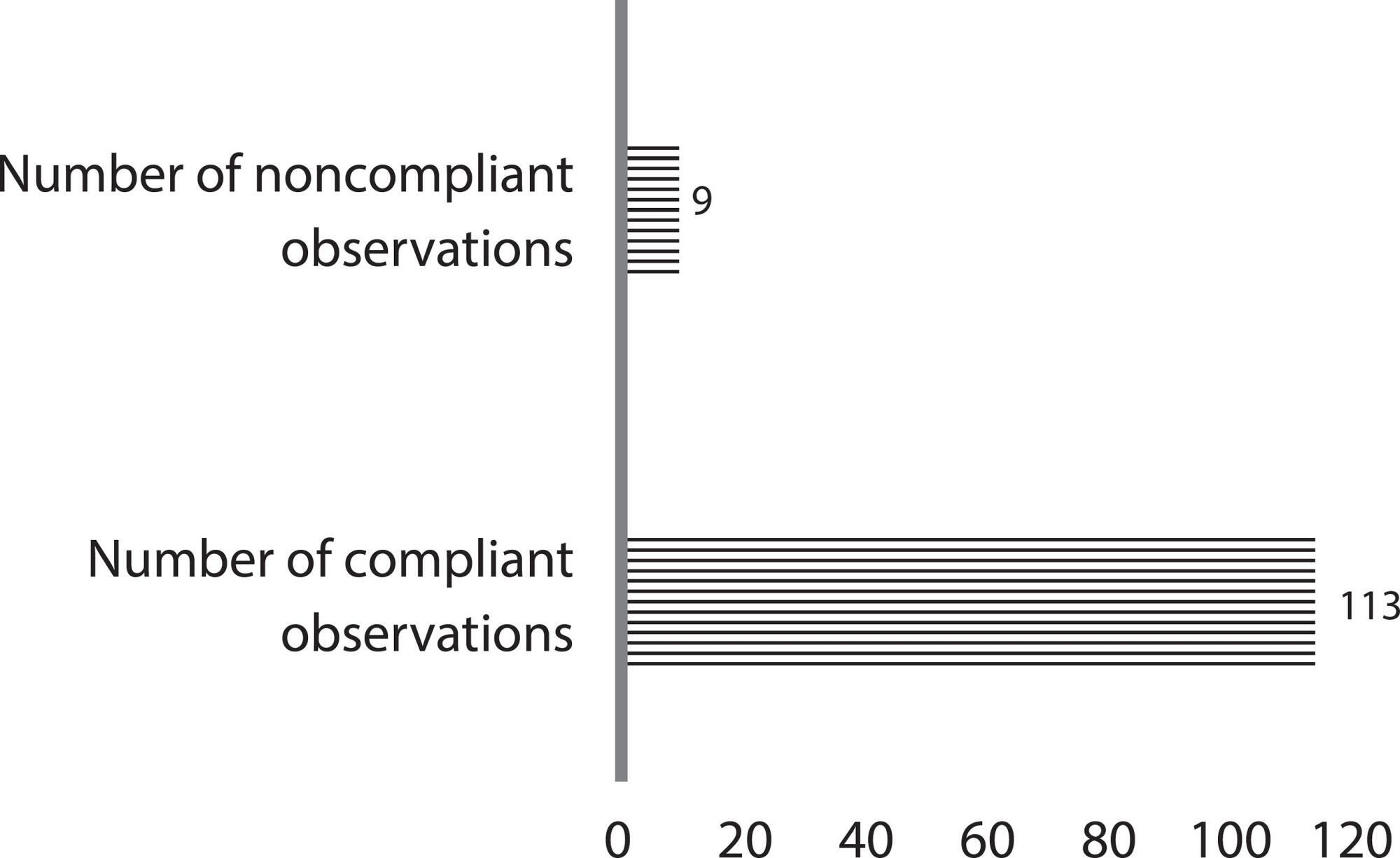-
RESEARCH
Technology-dependent children and the demand for pharmaceutical care
Revista Brasileira de Enfermagem. 2016;69(4):718-724
01-01-2016
Abstract
RESEARCHTechnology-dependent children and the demand for pharmaceutical care
Revista Brasileira de Enfermagem. 2016;69(4):718-724
01-01-2016DOI 10.1590/0034-7167.2016690415i
Views0See moreABSTRACT
Objective:
to understand the experience of mothers of technology-dependent children as regards pharmaceutical care.
Method:
this was a qualitative, descriptive-exploratory study developed based on open interviews using a structured characterization tool, and applied during home visits to 12 mothers caring for technology-dependent children. The data was submitted to inductive content analysis.
Results:
this study is split into two themes: (i) maternal overload during pharmaceutical care, demonstrating the need to administer drugs continuously and the repercussions of this exhaustive care on the caregivers; (ii) the ease or difficulty of access to the medicines required, showing informal strategies and support networks.
Conclusion:
pharmaceutical care is a daily challenge expressed in maternal overload and difficulty accessing the drugs, made worse by failures in the care network and coordinated care.
-
RESEARCH
Fasting of less than eight hours in urgent and emergency surgeries versus complication
Revista Brasileira de Enfermagem. 2016;69(4):712-717
01-01-2016
Abstract
RESEARCHFasting of less than eight hours in urgent and emergency surgeries versus complication
Revista Brasileira de Enfermagem. 2016;69(4):712-717
01-01-2016DOI 10.1590/0034-7167.2016690414i
Views0See moreABSTRACT
Objective:
to verify the occurrence of intraoperative and postoperative complications in patients undergoing urgent and emergency surgical procedures between January and December 2012, with fasting time of less than 8 hours.
Method:
a quantitative study was conducted, of the retrospective cohort type, through the analysis of medical records.
Results:
we included 181 records of patients undergoing surgical procedures with average duration of 59.4 minutes. Fractures correction surgeries stood out, totalling 32% of cases. We observed complications in 36 patients (19.9%), vomiting being the most prevalent (47.2%); followed by nausea (16.7%); need for blood transfusion (13.9%); surgical site infection (11.1%); and death (11.1%). The average fasting time was 133.5 minutes. The fasting time showed no statistically significant correlation with the complications investigated.
Conclusion:
intraoperative and postoperative complications were associated with the clinical conditions of the patients and not with the fasting time.
-
RESEARCH
Validation to Portuguese of the Debriefing Experience Scale
Revista Brasileira de Enfermagem. 2016;69(4):705-711
01-01-2016
Abstract
RESEARCHValidation to Portuguese of the Debriefing Experience Scale
Revista Brasileira de Enfermagem. 2016;69(4):705-711
01-01-2016DOI 10.1590/0034-7167.2016690413i
Views1See moreABSTRACT
Objective:
to translate and validate to Portuguese the Debriefing Experience Scale jointly with individuals that used high-fidelity simulation in learning.
Method:
methodological and exploratory study for an instrument translation and validation. For the validation process, the event “III Workshop Brazil – Portugal: Care Delivery to Critical Patients” was created.
Results:
103 nurses attended. Validity and reliability of the scale, the correlation pattern among variables, the sampling adequacy test, and the sphericity test showed good results. Since there was no relationship among the groups established in the exploratory factor analysis, the option was to follow the division established by the original version.
Conclusion:
the version of the instrument was called Escala de Experiência com o Debriefing. The results showed good psychometric properties and a good potential for use. However, further studies will contribute to consolidate the validity of the scale and strengthen its potential use.
-
RESEARCH
Factor analysis of an instrument to measure the impact of disease on daily life
Revista Brasileira de Enfermagem. 2016;69(4):697-704
01-01-2016
Abstract
RESEARCHFactor analysis of an instrument to measure the impact of disease on daily life
Revista Brasileira de Enfermagem. 2016;69(4):697-704
01-01-2016DOI 10.1590/0034-7167.2016690412i
Views0See moreABSTRACT
Objective:
to verify the structure of factors of an instrument to measure the Heart Valve Disease Impact on Daily Life (IDCV) when applied to coronary artery disease patients.
Method:
the study included 153 coronary artery disease patients undergoing outpatient follow-up care. The IDCV structure of factors was initially assessed by means of confirmatory factor analysis and, subsequently, by exploratory factor analysis. The Varimax rotation method was used to estimate the main components of analysis, eigenvalues greater than one for extraction of factors, and factor loading greater than 0.40 for selection of items. Internal consistency was estimated using Cronbach’s alpha coefficient. Results: confirmatory factor analysis did not confirm the original structure of factors of the IDCV. Exploratory factor analysis showed three dimensions, which together explained 78% of the measurement variance.
Conclusion:
future studies with expansion of case selection are necessary to confirm the IDCV new structure of factors.
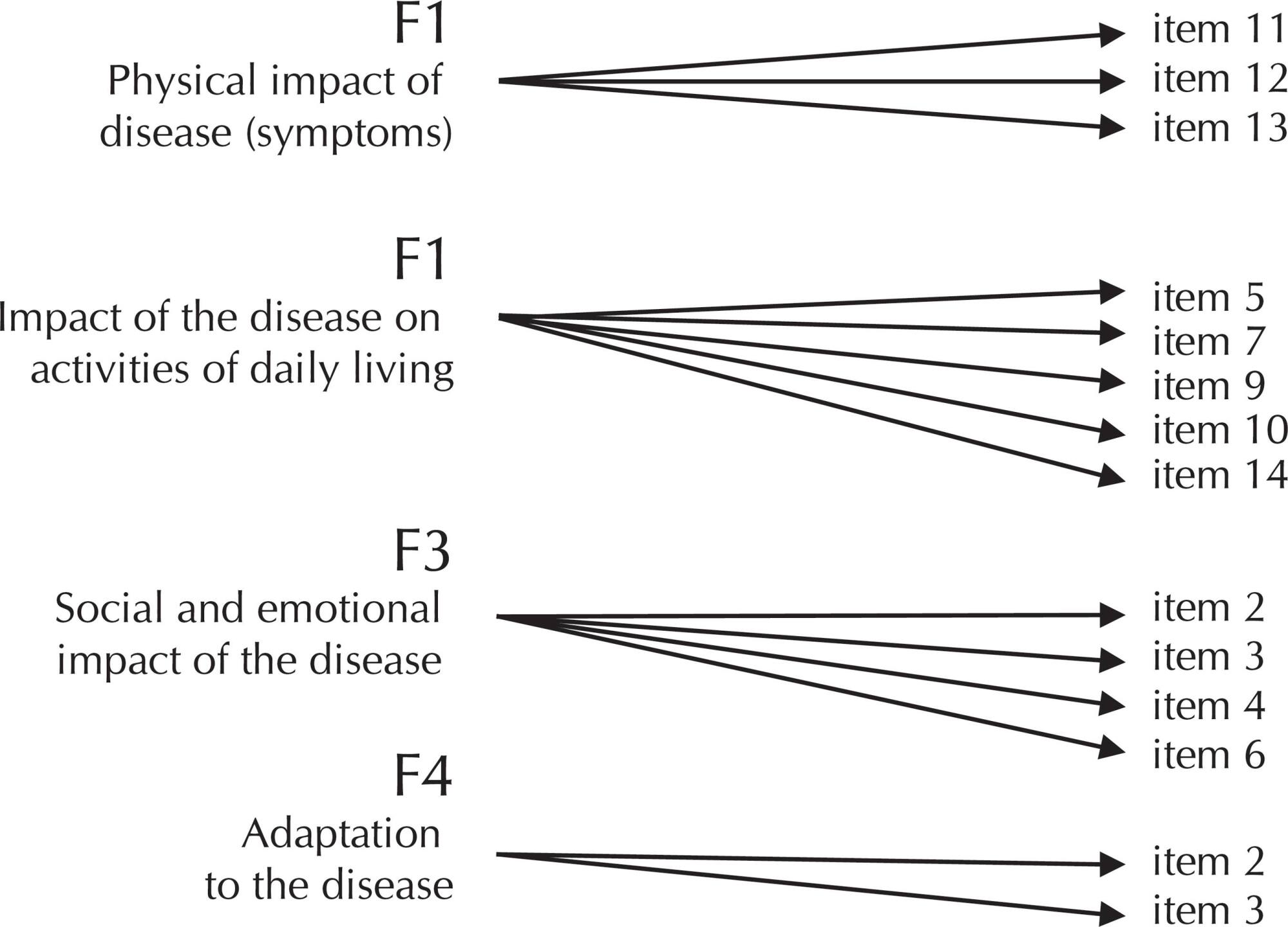
-
RESEARCH
Association of frailty in hospitalized and institutionalized elderly in the community-dwelling
Revista Brasileira de Enfermagem. 2016;69(4):691-696
01-01-2016
Abstract
RESEARCHAssociation of frailty in hospitalized and institutionalized elderly in the community-dwelling
Revista Brasileira de Enfermagem. 2016;69(4):691-696
01-01-2016DOI 10.1590/0034-7167.2016690411i
Views0See moreABSTRACT
Objective:
to investigate the association between frailty with hospitalization and institutionalization in a follow-up study of elderly residents.
Method:
the follow-up study was performed in 2008 and 2013 with elderly of both genders, aged 65 years and older who were living in the community-dwelling. The sampling procedure performed was probabilistic, with dual-stage clustering. In 2008, 515 elderly people were interviewed and, in 2013, 262. We used the socioeconomic and demographic data, self-reported morbidity, specific data of hospitalization and institutionalization. Frailty was measured by the Edmonton Frail Scale (EFS), and functional capacity through the Functional Independence Measure.
Results:
we found the mean gross EFS score was higher among resident elderly who were hospitalized and institutionalized and was statistically significant in both investigated years.
Conclusion:
the confirmation of association between frailty and hospitalization and institutionalization reinforces the importance of the subject, and highlights frailty as an important tool for risk estimates for these adverse events.
-
RESEARCH
Associação da fragilidade em idosos internados e institucionalizados na comunidade
Revista Brasileira de Enfermagem. 2016;69(4):691-696
01-01-2016
Abstract
RESEARCHAssociação da fragilidade em idosos internados e institucionalizados na comunidade
Revista Brasileira de Enfermagem. 2016;69(4):691-696
01-01-2016DOI 10.1590/0034-7167.2016690411i
Views0See moreRESUMEN
Objetivo:
investigar la asociación entre la fragilidad y la internación e institucionalización, en un estudio de acompañamiento de residentes ancianos.
Método:
el estudio de acompañamiento fue realizado en 2008 y 2013, con ancianos de ambos sexos, de 65 años o más, los cuales vivían en la comunidad. El procedimiento de muestreo realizado fue probabilístico, con agrupamiento en dos etapas. Fueron entrevistados 512 ancianos en 2008 y 262 en 2013. Datos socioeconómicos y demográficos, morbilidad relatada por los mismos y datos específicos de internación e institucionalización han sido utilizados. La fragilidad fue medida por la escala Edmond Frail Scale (EFS) y la capacidad funcional por la escala Functional Independence Measure (FIM).
Resultados:
El promedio de la puntuación EFS fue mayor entre los residentes ancianos que fueron internados y hospitalizados, siendo estadísticamente significativa en los dos años investigados.
Conclusión:
La confirmación de la asociación entre la fragilidad y la internación e institucionalización refuerza la importancia del tema y enfatiza la fragilidad como un instrumento importante en la evaluación de los riesgos para estos eventos adversos.
-
RESEARCH
Analysis of managerial and healthcare indicators after nursing personnel upsizing
Revista Brasileira de Enfermagem. 2016;69(4):684-690
01-01-2016
Abstract
RESEARCHAnalysis of managerial and healthcare indicators after nursing personnel upsizing
Revista Brasileira de Enfermagem. 2016;69(4):684-690
01-01-2016DOI 10.1590/0034-7167.2016690410i
Views0ABSTRACT
Objective:
analyze healthcare and managerial indicators after nursing personnel upsizing.
Method:
a retrospective, descriptive study was conducted using data from computer systems of a university hospital in southern Brazil. Healthcare and managerial indicators related to the first half of 2013 and 2014 were statistically analyzed.
Results:
increases of 40.0% in the number of nurses and 16.0% in the number of nursing technicians led to reductions of 12.0% in the number of sickness absences, 21.8% in positive balance for compensatory time off, 92.0% in paid overtime. Reductions of 75.0% in pressure ulcer rates, 10.5% in the number of falls and 50.0% in infections due to indwelling catheter use were also observed.
Conclusion:
nursing staff upsizing caused a positive impact on managerial and healthcare indicators and helped qualify care and improve work conditions for the nursing team.
Keywords:AbsenteeismHealth Care Quality IndicatorsHospital Nursing StaffHospital Personnel AdministrationPatient SafetySee more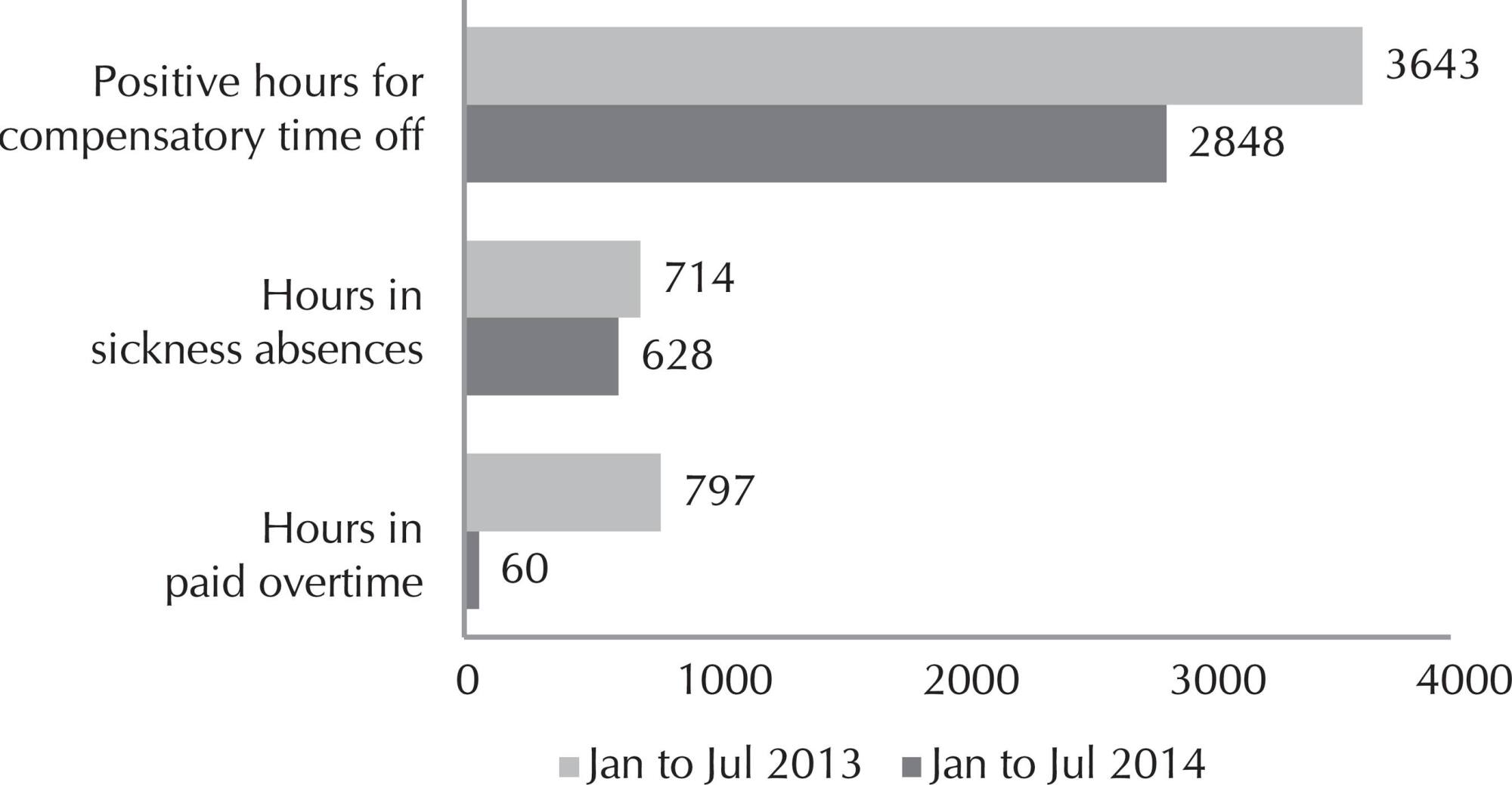
-
RESEARCH
Nurses’ managerial knowledge in the hospital setting
Revista Brasileira de Enfermagem. 2016;69(4):676-683
01-01-2016
Abstract
RESEARCHNurses’ managerial knowledge in the hospital setting
Revista Brasileira de Enfermagem. 2016;69(4):676-683
01-01-2016DOI 10.1590/0034-7167.2016690409i
Views0See moreABSTRACT
Objective:
to analyze nurses’ managerial skills in the hospital setting, their perception of their own education and the relevance of training for their professional practice.
Method:
qualitative study based on the dialectical hermeneutics framework. Thirty-two nurses from three hospitals in the Brazilian state of Minas Gerais contributed to the study by taking part in six focus groups. Records were transcribed and three categories emerged from content analysis.
Results:
results evidenced the following managerial skills: supervision, leadership, decision making, planning and organization, as well as the relevance of education centers for their improvement and the continuing development of the nurses’ managerial skills.
Conclusion:
the authors believe this investigation will contribute for the improvement of nurses’ necessary managerial skills and also to identify gaps in this area of their education.
-
Contents related to nursing professionals during the COVID-19 pandemic on the Youtube™ platform
Revista Brasileira de Enfermagem. 2021;74:e20200581
02-05-2021
Abstract
Contents related to nursing professionals during the COVID-19 pandemic on the Youtube™ platform
Revista Brasileira de Enfermagem. 2021;74:e20200581
02-05-2021DOI 10.1590/0034-7167-2020-0581
Views0See moreABSTRACT
Objective:
to characterize the content of Youtube™ videos related to nursing professionals during the COVID-19 pandemic.
Method:
a qualitative study that examined 47 videos on Youtube™ posted between 11/03 and 11/04 2020, which were subjected to thematic analysis.
Results:
four categories emerged: “the role of nurses in care production during the pandemic”, which addresses the management of services and individual care; “Overview of the pandemic from the perspective of nurses in different countries”, presenting experiences and encouraging physical distance; “Tributes and motivation to mobilize the category”, in addition to targeted tributes, calls for nurses to claim their rights; “Criticisms and demands to improve working conditions”, which highlights the insecurity of care provision settings.
Final considerations:
nursing work conditions in different countries, recognition of the importance of professionals during the pandemic, and claims of the category to improve working conditions were the main content found on Youtube™.
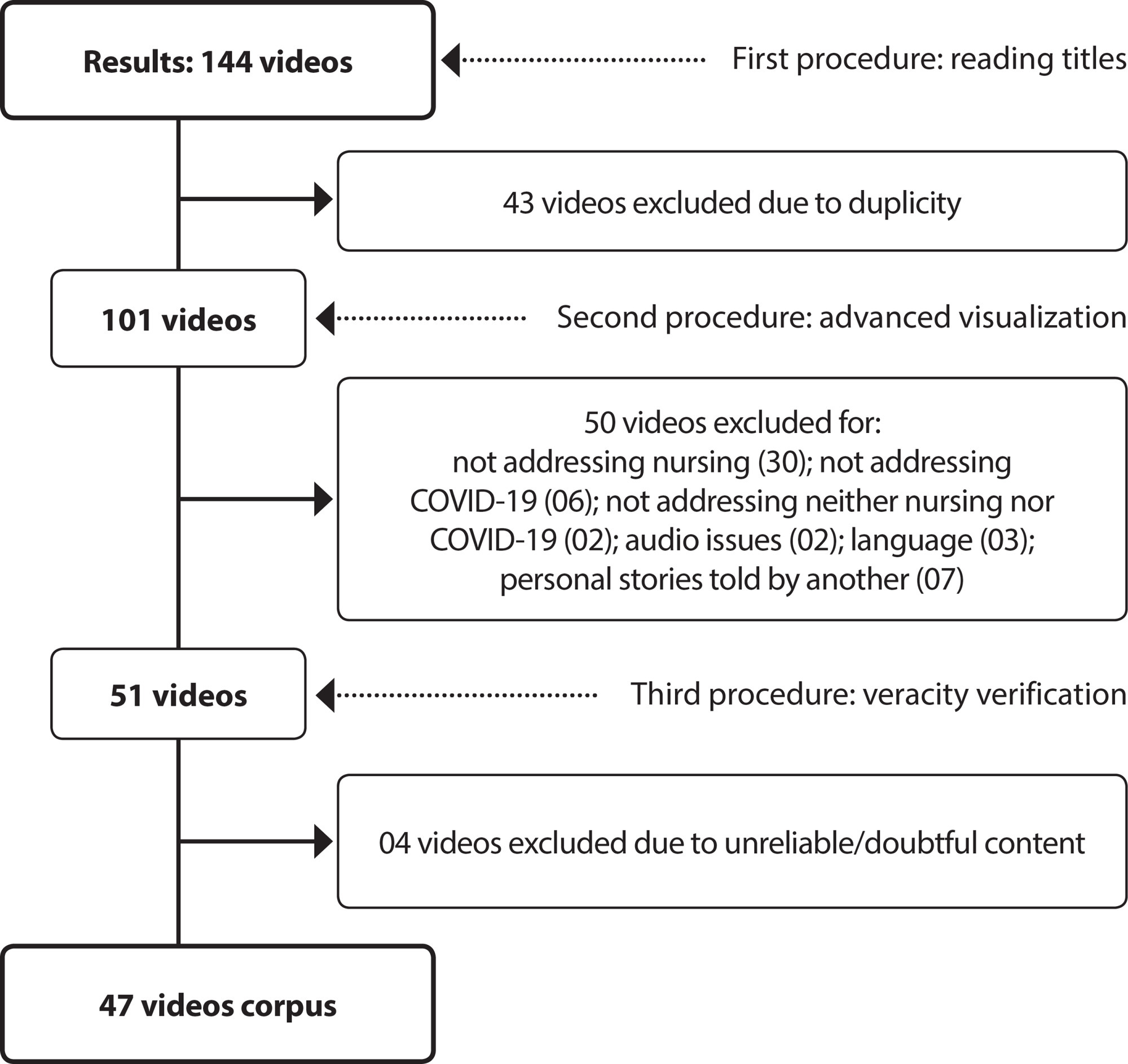
-
REVIEW
Prevention and control measures for neonatal COVID-19 infection: a scoping review
Revista Brasileira de Enfermagem. 2020;73:e20200467
07-13-2020
Abstract
REVIEWPrevention and control measures for neonatal COVID-19 infection: a scoping review
Revista Brasileira de Enfermagem. 2020;73:e20200467
07-13-2020DOI 10.1590/0034-7167-2020-0467
Views0See moreABSTRACT
Objective:
to identify with the literature the measures to prevent and control neonatal infection by COVID-19.
Methods:
a scope review carried out by searching for studies in databases and institutional health websites. The final sample was 25 articles.
Results:
among the main measures are the use of masks by suspected or infected people in contact with healthy newborns, hand hygiene before and after each care and feeding as well as the tools used for milking. It is indispensable to use personal protective equipment by health professionals in neonatology services to maintain a private room for infected newborns or to use physical barriers. Early diagnosis and timely case management is essential to reduce virus transmissibility.
Conclusions:
the research contributed to elucidate health and nursing actions in preventing and controlling neonatal infection by COVID-19.

-
REVIEW
Prevention and conduct against the Extravasation of antineoplastic chemotherapy: a scoping review
Revista Brasileira de Enfermagem. 2020;73(4):e20190008
06-17-2020
Abstract
REVIEWPrevention and conduct against the Extravasation of antineoplastic chemotherapy: a scoping review
Revista Brasileira de Enfermagem. 2020;73(4):e20190008
06-17-2020DOI 10.1590/0034-7167-2019-0008
Views0ABSTRACT
Objectives:
to identify and synthesize scientific evidence on prevention and management of extravasation of antineoplastic agents in adult patients by nurses.
Methods:
scoping review, according to Joanna Briggs Institute and PRISMA-ScR. Research was conducted in five electronic databases, Cochrane Library and eight catalogs of theses and dissertations. Data collection occurred from April to July 2018, with no time limit. The extracted data were analyzed and synthesized in a narrative way.
Results:
a total of 3,110 records were retrieved and 18 studies were kept for review. Most publications (66.6%) had a qualitative approach and addressed both aspects, i.e., prevention and management of extravasation of chemotherapy in adult patients.
Conclusions:
the implementation of protocols based on scientific evidence on prevention and management of extravasation of antineoplastic agents is paramount in order to provide patient safety and support to the nursing staff.
Keywords:Antineoplastic AgentsCombined ChemotherapyExtravasation of Therapeutic and Diagnostic MaterialsNursing CareOncologySee more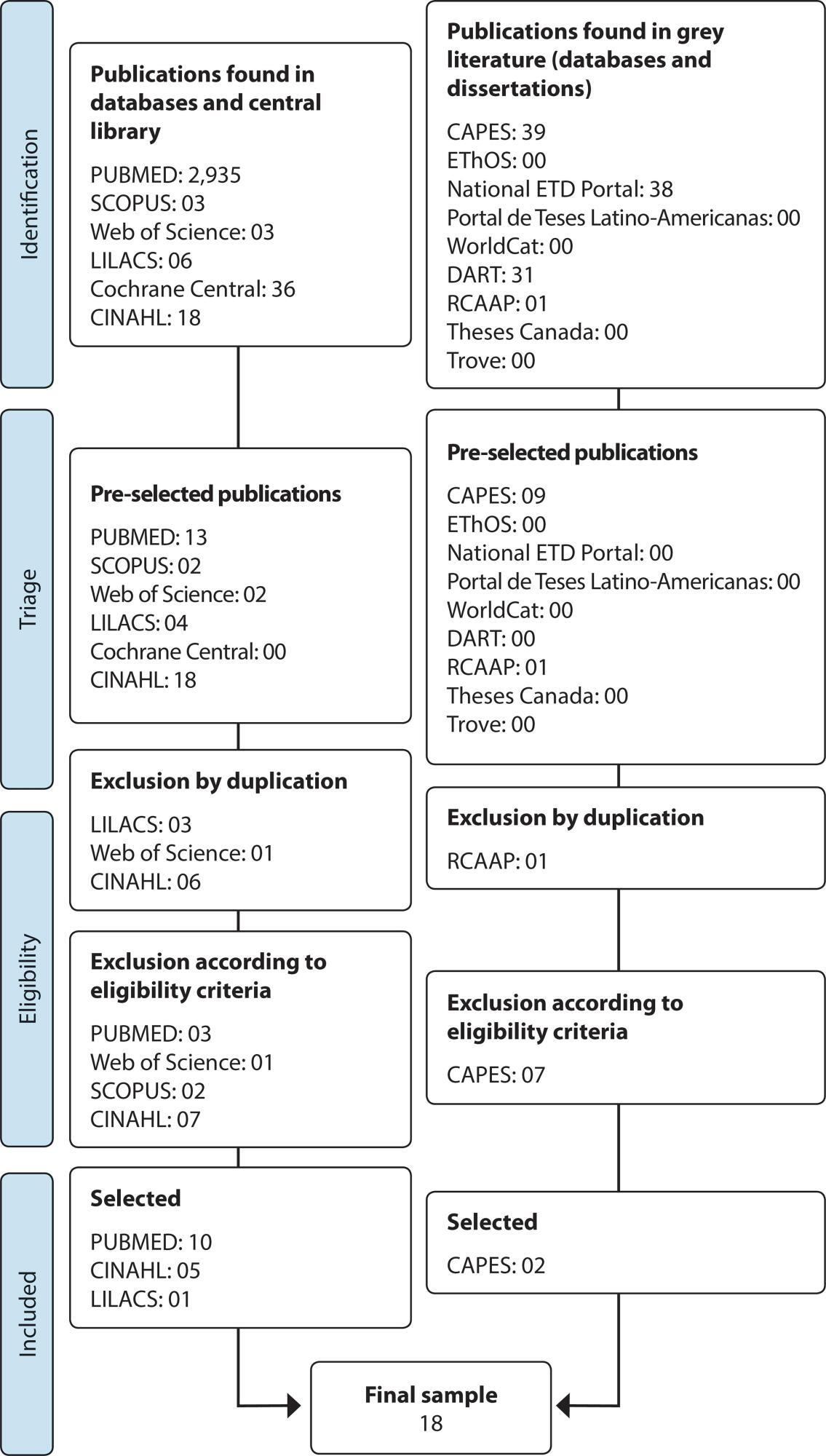
-
REFLECTION
Training and work process in Multiprofessional Residency in Health as innovative strategy
Revista Brasileira de Enfermagem. 2020;73(6):e20190635
09-07-2020
Abstract
REFLECTIONTraining and work process in Multiprofessional Residency in Health as innovative strategy
Revista Brasileira de Enfermagem. 2020;73(6):e20190635
09-07-2020DOI 10.1590/0034-7167-2019-0635
Views0ABSTRACT
Objectives: To
reflect about education in health and work process on three programs of multiprofessional residency in Florianópolis/SC.
Method:
Reflexive study about Multiprofessional Residency Health Programs of Florianópolis.
Results:
Multiprofessional Residency characterizes training health professionals through service education. Developing these professionals’ specialization with assignments that promote professional exercise and magnifies multiprofessional work at the same time, for excellency in unabridged healthcare.
Final Considerations:
Multiprofessional Residency Programs make interdisciplinary education, sharing knowledge between residents and other professionals stimulating development of innovation skills.
Keywords:Euducation, GraduateHealth PersonneInternship and ResidencyInterprofessional RelationsProfessional PracticeSee more -
ORIGINAL ARTICLE
Understanding the dramatic therapeutic play session: a contribution to pediatric nursing
Revista Brasileira de Enfermagem. 2020;73(4):e20180812
06-08-2020
Abstract
ORIGINAL ARTICLEUnderstanding the dramatic therapeutic play session: a contribution to pediatric nursing
Revista Brasileira de Enfermagem. 2020;73(4):e20180812
06-08-2020DOI 10.1590/0034-7167-2018-0812
Views0See moreABSTRACT
Objectives:
to understand how the dramatic therapeutic play session occurs within the care of hospitalized children.
Methods:
qualitative multiple case study, using theoretical references, such as symbolic interactionism and Vygotsky’s theory of symbolic play. Twenty play sessions performed with six children from 3 to 10 years old were analyzed, each corresponding to one case.
Results:
these sessions demonstrated that a dramatic therapeutic play session is a process of four interdependent and complementary steps: bonding, exploring, dramatizing, and play cessation. They also revealed the imaginary situations externalized by the child, the importance of the exploration step for which they manage the imaginary situation and catharsis, and how her higher psychological faculties are articulated during this process.
Final Considerations:
the results contribute to the understanding of the conduct and analysis of the dramatic therapeutic play session, reinforcing the importance of its use in pediatric nursing care practice.
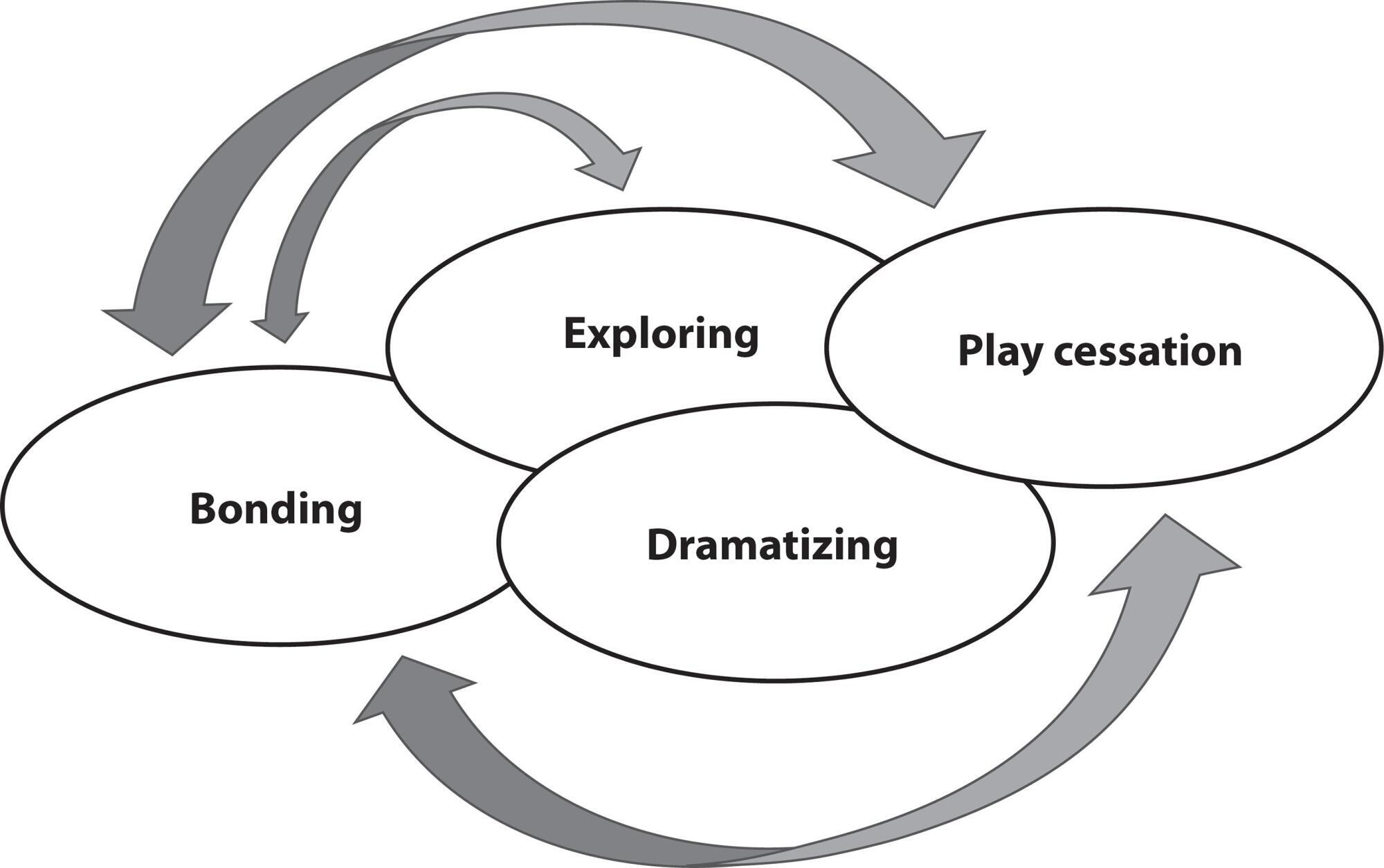
-
ORIGINAL ARTICLE
Common mental disorders in nursing students of the professionalizing cycle
Revista Brasileira de Enfermagem. 2020;73(1):e20180154
02-10-2020
Abstract
ORIGINAL ARTICLECommon mental disorders in nursing students of the professionalizing cycle
Revista Brasileira de Enfermagem. 2020;73(1):e20180154
02-10-2020DOI 10.1590/0034-7167-2018-0154
Views0See moreABSTRACT
Objectives:
to verify the suspicion of common mental disorders in nursing students of the professionalizing cycle and the association with sociodemographic features.
Method:
cross-sectional study with a sample of 85 students from a public university in the state of Rio de Janeiro (RJ) who responded to the Self-Report Questionnaire-20 and sociodemographic questions.
Results:
the suspicion prevalence of common mental disorders (CMD) in the sample was 55.3% and it was identified the association with the consumption of alcohol. Of the most frequent SRQ-20 complaints, 95.3% reported “feeling nervous, tense or worried”, 72.9% “having difficulty making decisions”, 60% “sleeping poorly” and 37.6% “having lost interest by things “.
Conclusion:
high prevalence of CMD in the sample and the association with the consumption of alcohol requires preventive and therapeutic actions among the students that minimize the possibility of severe mental disorders related to the consumption of alcohol and other drugs.
Search
Search in:
Nuvem de Tags
Aged (144) Atenção Primária à Saúde (239) COVID-19 (104) Cuidados de Enfermagem (269) Educação em Enfermagem (151) Educação em Saúde (139) Enfermagem (930) Estudos de Validação (131) Health Education (144) Idoso (208) Mental Health (149) Nursing (987) Nursing Care (306) Patient Safety (151) Primary Health Care (284) Qualidade de Vida (104) Quality of Life (106) Saúde Mental (145) Segurança do Paciente (150) Validation Studies (108)




